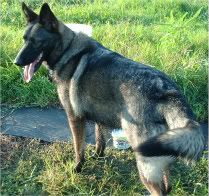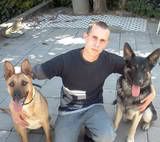 Re: my dog is really skinny
[Re: DONALD ANDERSON ]
#360655 - 05/09/2012 11:38 PM Re: my dog is really skinny
[Re: DONALD ANDERSON ]
#360655 - 05/09/2012 11:38 PM |
Webboard User

  
Reg: 09-23-2011
Posts: 2692
Loc: Marrero, LA
 Offline Offline |
|
I hear ya.
Sadie was 54lb the first time he examined her, and I directly asked him if he thought she was fit. He backed up and looked at her from several angles, then said he didn't see any excess weight.
Six months later, the scale was bouncing between 54lb and 55lb, and he was not pleased.
It's just a little frustrating to do everything you can think of to keep your dog fit, yet still experience slight weight gain. I look around and see 20lb cats and Chihuahuas that can hardly walk because they're so obese, but I have to admit to myself that somehow I'm a failure.

Sadie |
 Top Top
|
 Re: my dog is really skinny
[Re: DONALD ANDERSON ]
#360656 - 05/09/2012 11:49 PM Re: my dog is really skinny
[Re: DONALD ANDERSON ]
#360656 - 05/09/2012 11:49 PM |
Webboard User
Reg: 10-06-2011
Posts: 22
Loc:
 Offline Offline |
|
|
 Top Top
|
 Re: my dog is really skinny
[Re: DONALD ANDERSON ]
#360657 - 05/10/2012 12:01 AM Re: my dog is really skinny
[Re: DONALD ANDERSON ]
#360657 - 05/10/2012 12:01 AM |
Webboard User

Reg: 05-08-2008
Posts: 1473
Loc: Alaska
 Offline Offline |
|
Yes, I have used that as well for my skinny Dutchie. Pork does bother some dogs, I think its more the protein but hey, if you're not sure why bother. Chicken fat of course is fine too. Increase it slowly or you could have diarrhea.
Duanne, I had a dog who would put on weight if I accidentally dropped one extra kibble in her bowl. Even when I switched her to raw, I had to restrict her but it was easier. She was supposed to be about 38# but once got up to 55#.
A tired dog is a good dog, a trained dog is a better dog. |
 Top Top
|
 Re: my dog is really skinny
[Re: DONALD ANDERSON ]
#360660 - 05/10/2012 12:08 AM Re: my dog is really skinny
[Re: DONALD ANDERSON ]
#360660 - 05/10/2012 12:08 AM |
Webboard User
Reg: 10-06-2011
Posts: 22
Loc:
 Offline Offline |
|
yeah the tallow has a lot of omega 6's and 3's and fights cancer (supposedly) as well as the convenience of buying it by the jar so it would be my first choice =D
|
 Top Top
|
 Re: my dog is really skinny
[Re: Tresa Hendrix ]
#360754 - 05/10/2012 10:24 PM Re: my dog is really skinny
[Re: Tresa Hendrix ]
#360754 - 05/10/2012 10:24 PM |
Webboard User

   
Reg: 01-14-2010
Posts: 1564
Loc: USA
 Offline Offline |
|
RE: Carbs
Dogs can turn pure fat into protein when needed...but not carbs. I would not add carbs to a dog's diet for weigh gain by default. Rather, I would add fat in place of them from my experience and observations.
I am confused?? Do you mean turn fat into energy?
|
 Top Top
|
 Re: my dog is really skinny
[Re: Tammy Moore ]
#360755 - 05/10/2012 11:24 PM Re: my dog is really skinny
[Re: Tammy Moore ]
#360755 - 05/10/2012 11:24 PM |
Webboard User

   
Reg: 02-28-2008
Posts: 2075
Loc: Dallas, Texas
 Offline Offline |
|
It has always been my understanding that increased fats will also increase metabolism, and when that happens, it gets harder for a really skinny dog to keep weight on.
Sure the Iditarod dogs, which are like ultra marathoners, need huge amounts of proteins and fats to be able to run such a long and intense race. I am not sure it would be a fair thought to compare the OP's dog and this type of sled dog. Unless the OP is running his dog in the same manner.
I still think that if a dog just can't seem to put weight on and is showing too much rib bones, that quality carbs are the way to go. The low glycemic ones all the better. 
ETA; Here is an interesting read about Iditarod dogs.
http://www.scientificamerican.com/article.cfm?id=sled-dog-science
Joyce Salazar
 |
 Top Top
|
 Re: my dog is really skinny
[Re: Joyce Salazar ]
#360757 - 05/10/2012 11:41 PM Re: my dog is really skinny
[Re: Joyce Salazar ]
#360757 - 05/10/2012 11:41 PM |
Webboard User

Reg: 05-08-2008
Posts: 1473
Loc: Alaska
 Offline Offline |
|
Joyce,
Read it again, I was not comparing her GSD to dogs running the Iditarod or suggesting she feed her dog like that...that's a lot of calories!
Changing the fat content of anything's diet doesn't change the metabolic type of the creature. This stuff works on a cellular level and you have to balance that right so the body runs perfectly, its not that difficult to balance it for a dog vs a human. I would not add carbs by default, that would be a last resort if fat or protein did not work.
I recommend The Metabolic Typing Diet by Trish Fahey and William Wolcott. Its about humans but gives a lot of info to understand other animals. Another great place for reading on dog nutrition is http://healthypets.mercola.com/ (don't reading the training stuff, its anti-prong)
A tired dog is a good dog, a trained dog is a better dog. |
 Top Top
|
 Re: my dog is really skinny
[Re: DONALD ANDERSON ]
#360818 - 05/11/2012 03:19 PM Re: my dog is really skinny
[Re: DONALD ANDERSON ]
#360818 - 05/11/2012 03:19 PM |
Webboard User

  
Reg: 09-28-2009
Posts: 487
Loc: Alaska
 Offline Offline |
|
I feed high performance kibble and supplement with tallow, meat, aand eggs during winter race season. I supplement daily with salmon oil. I chose Annamaet Ultra for my high energy dogs, and feed the Annamaet grain free to my GSD who is also very active but has an unfortunately low metabolic rate.
I've also considered Innushuk, and Dr. Tim's Momentum but do not have an easy way to get these foods. They are also high-performance kibbles.
I'd recommend going with a high performance kibble first. I don't think fat supplementation is then required unless your dog is very active (100 miles a week or much more). You can throw off the nutritional balance if you supplemnt a quality kibble too much.
If you want to do further reading I've attached a few links:
An interesting read on racing long-distance sled dog nutrition:
http://www.mushing.com/articles/content.php?vw=,,,633
Why most mushers do not feed just meat, esspecially year round see- http://www.mushing.com/articles/content.php?vw=,,,798
"On the other hand if you have a kennel of open-class sprint dogs with short coats and live in a cold environment, or you have a distance team that is training and racing very long miles, you will find yourself with much higher caloric needs and may need to supplement with meats and fats. If you can obtain quality, unspoiled, frozen or fresh meat in your area for less than 30 cents per pound, you may be approaching the calories per dollar of kibble, and it may be worth giving a try. If you do this, make sure to consult with a canine nutritionist to make sure the levels you are feeding aren’t throwing the Phosphorous/Calcium and Omega 6 to Omega 3 balances out of line. Only trial and error with your own dogs in your own environment, under your own training and racing conditions will show you whether or not you have to go to the expense and hassle of supplementing their diet."
|
 Top Top
|
 Re: my dog is really skinny
[Re: Kiersten Lippman ]
#360820 - 05/11/2012 04:32 PM Re: my dog is really skinny
[Re: Kiersten Lippman ]
#360820 - 05/11/2012 04:32 PM |
Moderator

   
Reg: 07-13-2005
Posts: 31580
Loc: North-Central coast of California
 Offline Offline |
|
"You can throw off the nutritional balance if you supplemnt a quality kibble too much. "
Ditto!
PS
And the O.P.'s dog is 12 months old ..... still growing.
|
 Top Top
|
 Re: my dog is really skinny
[Re: Kiersten Lippman ]
#360832 - 05/11/2012 09:10 PM Re: my dog is really skinny
[Re: Kiersten Lippman ]
#360832 - 05/11/2012 09:10 PM |
Webboard User

   
Reg: 02-28-2008
Posts: 2075
Loc: Dallas, Texas
 Offline Offline |
|
Very informative Kiersten, I learned something today from your second link above.
CARBOHYDRATES
Carbohydrates are pure energy. That is all that they can be used for. There is a very tiny amount of carbohydrate that can be used structurally, but most of it is either going to be burned directly for energy, stored in muscle glycogen, or if there is an excess, it will be converted to triglycerides and stored as fat. That is the fate of carbs, they are an absolute necessity, but you don’t want to overdo it.
and I found this too that explains a lot about dogs and carbs;
http://rawfed.com/myths/carbs.html
Carbohydrates do provide quick and easy energy. However, it is not 'carbs' that maintain the health of the organs listed in the quotes above, but glucose. Glucose can be obtained from both fat and protein through a process known as gluconeogenesis, where amino acids and fat (not fatty acids; those use a different cycle) are "converted" to glucose. If carbs are present, though, they will be converted to energy first before fat and protein because they are easier to use. This is the reason that carbs regulate how much starch and fat will be broken down and utilized. If there is a plethora of carbohydrates, fat will be stored instead of used. If there are not enough carbs to fulfill energy needs, then fat will be converted to glucose and used. If no carbs are present, then fat and protein are used to fill energy needs. Excess carbohydrates are stored in the liver and the muscles as glycogen AND in the body as fat. However, since carboydrates are not the only source of glycogen (which also comes from proteins and fats through a process known as glyconeogenesis), they are not absolutely necessary. Human athletes commonly perform 'carbo loading' techniques where they eat huge carby meals of things like pasta to rapidly replenish their glycogen stores in their muscles and liver before a competition. The carbohydrates, when in excess, are more rapidly converted and stored as glycogen compared to fat and protein. HOWEVER, once again, fat and protein can also be stored as glycogen, which makes carbohydrates unnecessary unless you want to perform 'carbo loading'. I believe it is Purina that has capitalized on this and now has "energy bars" of complex carbohydrates for the canine athlete to help them recover more quickly between events. But, carbohydrates do not rebuild spent muscle tissue, etc. Protein does that. Fat is also easily utilized for quick energy, too, and provides more energy per gram that carbohydrate does.
and finally this;
One other comment I have here is that as long as the animal is receiving appropriate fat and protein, glucose production will not be an issue. And for carnivorous animals like dogs, I cannot help but wonder if their white blood cells are more sensitive to glucose than ours—meaning, less glucose is needed to "stimulate" canine white blood cell (WBC) production compared to human WBC production. What about thyroid function? Thyroid function is dependent upon the correct amount of GLUCOSE produced by the dog's body, not by the correct amount of carbohydrates in the diet. Too much glucose from easily available carbohydrate energy sources can cause just as many problems as not enough glucose. Since we have already established that glucose can be produced from fat and protein, then it would again seem that carbohydrates are actually unnecessary provided that there is enough protein and fat to go around (and a raw diet has PLENTY!).
B compounds, or B vitamins, are found not only in the dog's own intestine (bacteria produce some B vitamins) but also in the meat and organs of prey animals. Feeding a variety of organ meats as part of a proper raw diet will cover the B-vitamin requirement quite easily. One has to wonder: how much of the B compounds in grain and starch and veggies is actually available to the dog? Compared to something more bioavailable like liver, then I would say 'not much.'
I stand corrected on the use of carbs in a canine diet. Not that some dogs don't do well with limited, and quality carbs, this site was great for understanding how dogs utilize proteins, fats and carbohydrates.
Joyce Salazar
 |
 Top Top
|
When purchasing any product from Leerburg Enterprises, Inc. it is understood
that any and all products sold by Leerburg Enterprises, Inc. are sold in Dunn
County Wisconsin, USA. Any and all legal action taken against Leerburg Enterprises,
Inc. concerning the purchase or use of these products must take place in Dunn
County, Wisconsin. If customers do not agree with this policy they should not
purchase Leerburg Ent. Inc. products.
Dog Training is never without risk of injury. Do not use any of the products
sold by Leerburg Enterprises, Inc. without consulting a local professional.
The training methods shown in the Leerburg Ent. Inc. DVD’s are meant
to be used with a local instructor or trainer. Leerburg Enterprises, Inc. cannot
be held responsible for accidents or injuries to humans and/or animals.
Copyright 2010 Leerburg® Enterprises, Inc. All rights reserved. All photos and content on leerburg.com are part of a registered copyright owned by Leerburg Enterprise, Inc.
By accessing any information within Leerburg.com, you agree to abide by the
Leerburg.com Privacy Policy and Terms of Use.
 Previous Topic
Previous Topic Index
Index Next Topic
Next Topic













 Top
Top





